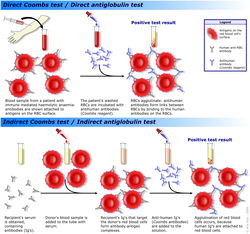Coombs test
(Redirected from Indirect Coombs test)
The Coombs test, also known as the antiglobulin test, is a clinical blood test used to detect antibodies that may bind to the surface of red blood cells (RBCs). It is primarily used in the diagnosis of hemolytic anemia, hemolytic disease of the newborn, and in blood transfusion compatibility testing.
Types of Coombs Test
There are two main types of Coombs tests:
Direct Coombs Test
The Direct Coombs Test (DCT), also known as the Direct Antiglobulin Test (DAT), is used to detect antibodies or complement proteins that are bound to the surface of red blood cells. This test is commonly used to diagnose conditions such as autoimmune hemolytic anemia and hemolytic disease of the newborn.
Indirect Coombs Test
The Indirect Coombs Test (ICT) is used to detect antibodies that are present in the serum and are capable of binding to red blood cells. This test is often used in prenatal testing of pregnant women and in testing blood prior to transfusion.
Procedure
The Coombs test involves the following steps:
1. Sample Collection: A blood sample is collected from the patient. 2. Addition of Coombs Reagent: The Coombs reagent, which contains anti-human globulin, is added to the blood sample. 3. Observation for Agglutination: The sample is observed for agglutination (clumping) of red blood cells, which indicates a positive result.
Clinical Significance
The Coombs test is significant in several clinical scenarios:
- Autoimmune Hemolytic Anemia: The direct Coombs test can confirm the presence of antibodies that are causing the destruction of red blood cells.
- Hemolytic Disease of the Newborn: The test can detect antibodies in the mother that may attack the red blood cells of the fetus.
- Blood Transfusion: The indirect Coombs test is used to screen for antibodies in the recipient's serum that may react with donor red blood cells.
Limitations
While the Coombs test is a valuable diagnostic tool, it has limitations. False positives can occur due to non-specific binding, and false negatives may occur if the antibody levels are too low to detect.
Also see
| Medical tests | ||||||||||
|---|---|---|---|---|---|---|---|---|---|---|
This medical test related article is a stub. You can help WikiMD by expanding it.
|
Transform your life with W8MD's budget GLP-1 injections from $125.
W8MD offers a medical weight loss program to lose weight in Philadelphia. Our physician-supervised medical weight loss provides:
- Most insurances accepted or discounted self-pay rates. We will obtain insurance prior authorizations if needed.
- Generic GLP1 weight loss injections from $125 for the starting dose.
- Also offer prescription weight loss medications including Phentermine, Qsymia, Diethylpropion, Contrave etc.
NYC weight loss doctor appointments
Start your NYC weight loss journey today at our NYC medical weight loss and Philadelphia medical weight loss clinics.
- Call 718-946-5500 to lose weight in NYC or for medical weight loss in Philadelphia 215-676-2334.
- Tags:NYC medical weight loss, Philadelphia lose weight Zepbound NYC, Budget GLP1 weight loss injections, Wegovy Philadelphia, Wegovy NYC, Philadelphia medical weight loss, Brookly weight loss and Wegovy NYC
|
WikiMD's Wellness Encyclopedia |
| Let Food Be Thy Medicine Medicine Thy Food - Hippocrates |
Medical Disclaimer: WikiMD is not a substitute for professional medical advice. The information on WikiMD is provided as an information resource only, may be incorrect, outdated or misleading, and is not to be used or relied on for any diagnostic or treatment purposes. Please consult your health care provider before making any healthcare decisions or for guidance about a specific medical condition. WikiMD expressly disclaims responsibility, and shall have no liability, for any damages, loss, injury, or liability whatsoever suffered as a result of your reliance on the information contained in this site. By visiting this site you agree to the foregoing terms and conditions, which may from time to time be changed or supplemented by WikiMD. If you do not agree to the foregoing terms and conditions, you should not enter or use this site. See full disclaimer.
Credits:Most images are courtesy of Wikimedia commons, and templates, categories Wikipedia, licensed under CC BY SA or similar.
Contributors: Prab R. Tumpati, MD


